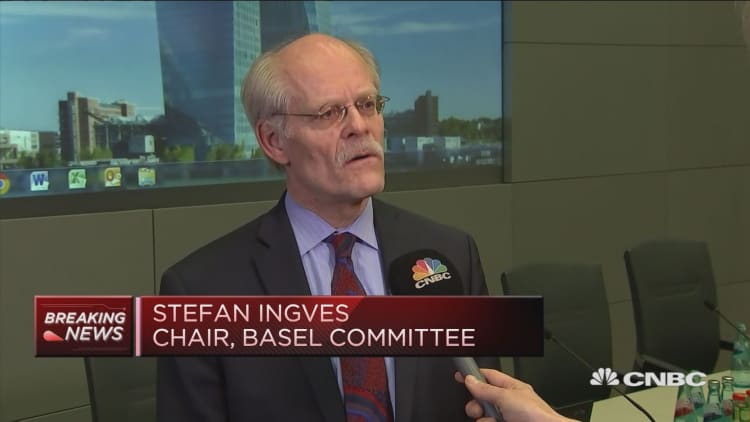Financial regulators reached a long-sought deal on Thursday to harmonize global banking rules, capping a decade of effort to make banks more resilient even if they fell short of their own initial hopes.
Facing fierce opposition from the banking industry and calls from the U.S. administration to backtrack on some measures, policymakers struck a compromise agreement on rules forcing banks to hold more capital and cash to avoid a repeat of the 2008 financial crash.
Conceived in the aftermath of the global financial crisis when taxpayers had to rescue some of the world's biggest lenders, the rules, known as Basel III, aim to shield governments by having private investors suffer losses first.
"The focus of the reforms was to reduce regulatory uncertainty," European Central Bank President Mario Draghi, the chairman of Basel's oversight body, said.
"Now its time is for implementation and not further design," Draghi told a news conference.
The final step in the deal will be for legislators around the globe to ratify the agreement, another potentially time consuming exercise, especially after some U.S. lawmakers have argued for relaxing financial regulation.
Thursday's compromise focused on when banks would have to increase capital on their trading books and on the way large lenders self-assess the risks they take - two issues that divided countries on either side of the Atlantic.

U.S. banks have resisted the trading book proposal and as a compromise, regulators agree that the new rules would take effect in 2022, later than previous expectations for 2019, in part after the U.S. Treasury asked for a delay.
With regards to risk assessment, European banks complained that the compromise proposal would put them at a disadvantage to their U.S. rivals by requiring bigger capital buffers against mortgages.
The Americans argued that they have done more to repair their balance sheets after the crisis so they are not weighed down by poor legacy assets like the Europeans.
French banks in particular resisted and Paris finally relented only when a long phase-in period was proposed, putting the rules into full force only by the start of 2027.
In addition, local supervisors will have the power to mitigate the impact of these new measures during the phase-in period.
The European Banking Authority said that the total capital shortfall created by these reforms would amount to 39.7 billion euros ($46.82 billion) for the biggest banks in the region.
"This deal will make corporate financing in Europe more expensive and this is bad news for the real economy," Markus Ferber, a German and a conservative member of the European Parliament, said
Shortcomings
The reforms do have their shortcomings, however.
The 'bailing in' of private investors has not worked as intended so far, a reduction in banks' heavy exposure to government debt has not been tackled and loosely regulated investment funds are turning into "shadow banks" by slowly taking business away from regular lenders.
The Basel reforms have been a particular boost for shadow banking - financial intermediaries ranging from hedge funds to special purpose vehicles - because financial firms are facing easier regulation and lower liquidity requirements just as their banking rivals adjust to costly new rules.
Shadow banks have outpaced regular lenders in international credit growth for most of the past decade. In the European Union alone they have assets of more than 40 trillion euros, the European Systemic Risk Board said earlier.
"It's high time to extend some of this regulation to the shadow banking sector," Draghi said.
Bail-ins, where bond- and shareholders and possibly depositors take losses before governments, have also been a problem, particularly in the failure of two Italian banks earlier this year, when a loophole in euro zone rules was utilized to channel state funds to them.
The state support raised questions about the viability of bail-in and whether governments could in the worst case hit large depositors.
Another issue not tackled is the so-called "doom loop" between banks and governments.
In need of safe assets, banks often hold lots of government debt, which is generally deemed risk free. But if a sovereign were to fail, such a tight-knit relationship would inevitably bring down banks as well, exacerbating any crisis.
Draghi said many if not most countries on the committee opposed introducing risk weights on government bonds.
Timing has also been an issue. Many of the Basel rules are implemented with big lags and will not take effect for years to come, well over a decade after the start of the original crisis.

